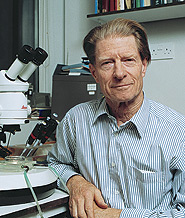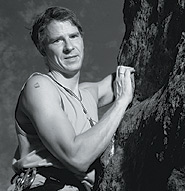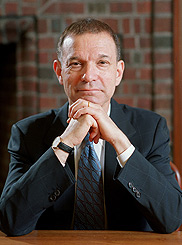Berkeleyan
Cells, consciousness, and Shakespeare
Hitchcock, Foerster, and Avenali lecturers to address a stimulating range of topics in the coming weeks
![]()
08 March 2006
Four lectures by three prestigious lecturers in the span of one week will reward the intellectually curious later this month.
 Sir John Gurdon |
On Wednesday, March 15, the first of two Hitchcock Lectures will be delivered by biologist Sir John Gurdon, best- known for his groundbreaking studies in nuclear transplantation, which galvanized efforts to clone a mammal from an adult cell - a quest that in 1996 produced a healthy sheep named Dolly. That lecture, entitled "From Egg to Adult and Back Again," will begin at 4:10 p.m. in the Chevron Auditorium in International House, 2299 Piedmont Ave. Gurdon's second Hitchcock Lecture, the following day (same time and place), is entitled "Cloning, Stem Cells, and Cell Replacement."
In addition to discovering that cells of the body are capable of differentiating into all cell types of a vertebrate animal, Gurdon provided unprecedented evidence that nuclear transplantations from specialized cells could give rise to adult, fertile genetic copies of their donor. His findings also yielded wide-ranging medical implications for the use of stem cells in tissue therapy. Having spent many years as a faculty member and researcher at Oxford and Cambridge universities, he is currently an active researcher at the Wellcome Trust/Cancer Research UK Gurdon Institute of Cancer and Developmental Biology at Cambridge.
 Christof Koch |
Koch, the Lois and Victor Troendle Professor of Cognitive and Behavioral Biology at the California Institute of Technology, was a longtime collaborator with Francis Crick, co-discoverer of DNA. During that time he developed a pioneering account of the underlying neuronal bases of visual perception, attention, and consciousness. He is also credited with advancing the fundamental premise of this quest - that the relationship between consciousness and neural systems can be approached using the modern tools of neurobiology. He voiced his findings in the provocative 2004 book The Quest for Consciousness: A Neuroscientific Approach, directed at scientists and general readers alike.
 Stephen Greenblatt |
Greenblatt, winner of the Distinguished Teaching Award at Berkeley in 1983 and presenter of a Faculty Research Lecture in 1996, is a specialist in Shakespeare, 16th- and 17th-century English literature, the literature of travel and exploration, and literary theory. He is the general editor of The Norton Shakespeare and The Norton Anthology of English Literature. His recent book Will in the World: How Shakespeare Became Shakespeare was a finalist for the Pulitzer Prize, the National Book Awards, the National Book Critic Circle Awards, and the Los Angeles Times Book Awards, among other honors. A past president of the Modern Language Association of America, he is a member of the American Academy of Arts and Sciences.

